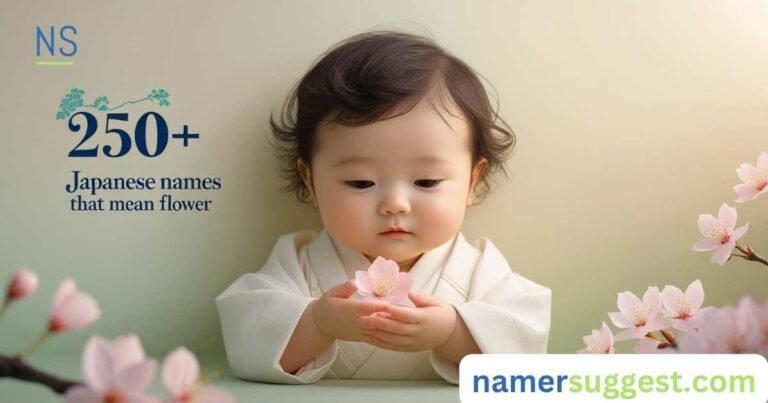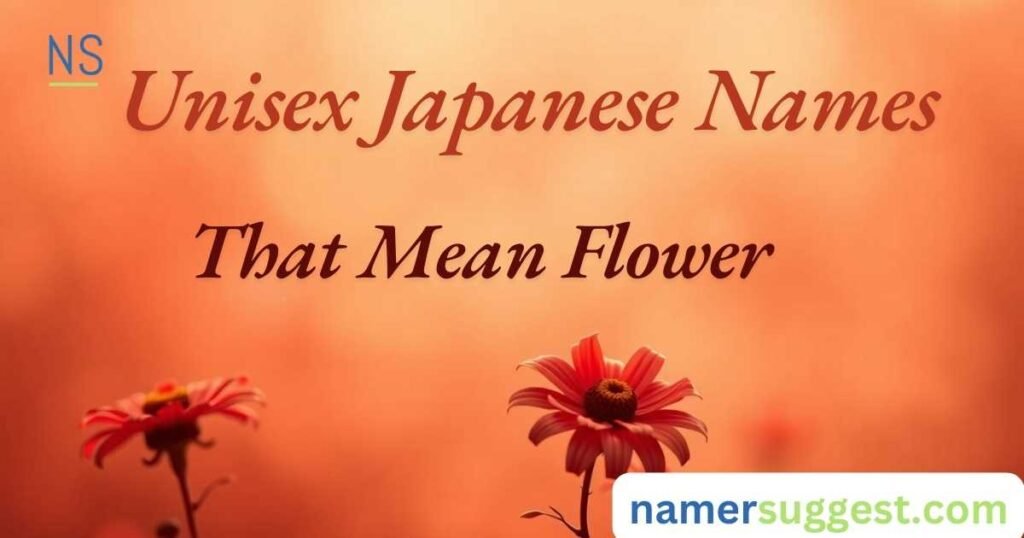
Japanese names carry deep meanings, often inspired by nature, culture, and tradition. Among these, flower-inspired names stand out for their beauty and elegance. If you’re looking for Japanese names that mean flower, this guide offers over 250+ options, celebrating the timeless connection between flowers and Japanese culture.
Let’s dive into the beautiful world of Japanese names that reflect the symbolism of flowers, perfect for girls, boys, and even unisex options.
Japanese Names That Mean Flower Generator
Our Japanese Names That Mean Flower Generator is a creative tool designed to help you discover unique, floral-inspired names with deep meanings rooted in Japanese culture. Whether you’re naming a baby, a character, or seeking inspiration, this generator provides endless possibilities tailored to your needs.

Discover the Beauty of Flower-Inspired Japanese Names
In Japanese culture, flowers are more than just decorative. They are symbols of life, emotions, and seasons, deeply rooted in traditions like Hanakotoba—the language of flowers. This guide is your perfect companion to finding meaningful names derived from flowers, offering a blend of history, culture, and creative inspiration.
Whether you’re naming a baby, a character, or simply curious, let’s explore these names that embody the grace of Japanese flora.
Top Picks: Popular Flower-Inspired Japanese Names

Sometimes, you need a quick list of tried-and-true favorites. Here are some of the most popular flower-inspired Japanese names for your inspiration:
- Sakura (桜) – Cherry blossom
- Hana (花) – Flower
- Ren (蓮) – Lotus
- Ayame (菖蒲) – Iris
- Botan (牡丹) – Peony
- Tsubaki (椿) – Camellia
- Kaede (楓) – Maple leaf (symbolic like a flower)
- Sumire (菫) – Violet
- Ume (梅) – Plum blossom
- Yuri (百合) – Lily
- Himawari (向日葵) – Sunflower
- Momiji (紅葉) – Autumn leaves
- Fuji (藤) – Wisteria
- Suzuran (鈴蘭) – Lily of the valley
- Hinata (向日葵) – Facing the sun
- Sakurao (桜尾) – Cherry blossom tail
- Shion (紫苑) – Aster
- Momo (桃) – Peach blossom
- Kiku (菊) – Chrysanthemum
- Akane (茜) – Madder plant
Fun Fact: The cherry blossom (Sakura) is Japan’s national flower and represents the fleeting beauty of life.
The Significance of Flowers in Japanese Culture
Flowers have been cherished in Japanese culture for centuries. From Hanami (flower viewing) festivals to Hanakotoba, flowers are more than symbols; they tell stories and express emotions. In naming traditions, floral names are considered lucky and meaningful, representing beauty, grace, and connection to nature.
Japanese names are deeply intertwined with seasonal cycles, reflecting the transient beauty of life and the changing seasons. Flowers often carry spiritual significance, making them a popular choice for baby names.
Names with Meanings Associated Flowers
Here’s a table of 20 names with their meanings and associated flowers:
| Name | Meaning | Associated Flower |
| Sakura (桜) | Cherry blossom | Sakura (Cherry Blossom) |
| Ume (梅) | Plum blossom | Ume (Plum Blossom) |
| Ren (蓮) | Lotus | Ren (Lotus) |
| Ayame (菖蒲) | Iris | Ayame (Iris) |
| Botan (牡丹) | Peony | Botan (Peony) |
| Yuri (百合) | Lily | Yuri (Lily) |
| Himawari (向日葵) | Sunflower | Himawari (Sunflower) |
| Kiku (菊) | Chrysanthemum | Kiku (Chrysanthemum) |
| Kaede (楓) | Maple leaf (symbolic) | Kaede (Maple Leaf) |
| Tsubaki (椿) | Camellia | Tsubaki (Camellia) |
| Shion (紫苑) | Aster | Shion (Aster) |
| Sumire (菫) | Violet | Sumire (Violet) |
| Fuji (藤) | Wisteria | Fuji (Wisteria) |
| Momiji (紅葉) | Autumn leaves | Momiji (Autumn Leaves) |
| Suzuran (鈴蘭) | Lily of the valley | Suzuran (Lily of the Valley) |
| Akane (茜) | Madder plant | Akane (Madder Plant) |
| Momo (桃) | Peach blossom | Momo (Peach Blossom) |
| Sakurao (桜尾) | Cherry blossom tail | Sakurao (Cherry Blossom) |
| Hinata (向日葵) | Facing the sun | Hinata (Sunflower) |
| Sumika (澄花) | Pure flower | Sumika (Clear Flower) |
Japanese Girls Names Inspired by Flowers

Japanese girls’ names often feature flowers to symbolize beauty, grace, and delicacy. These names are not only poetic but also deeply meaningful. Here’s a list of 20 floral names for girls:
- Hana (花) – Flower
- Sakura (桜) – Cherry blossom
- Yuri (百合) – Lily
- Sumire (菫) – Violet
- Ayaka (彩花) – Colorful flower
- Tsubaki (椿) – Camellia
- Momoka (桃花) – Peach flower
- Hinagiku (雛菊) – Daisy
- Ume (梅) – Plum blossom
- Kaori (香り) – Fragrance (often of flowers)
- Haruka (春花) – Spring flower
- Aoi (葵) – Hollyhock
- Misaki (美咲) – Beautiful blossom
- Nanami (七海) – Seven seas (symbolic of lotus)
- Shizuka (静花) – Quiet flower
- Ran (蘭) – Orchid
- Nozomi (希美) – Hope and beauty
- Koharu (小春) – Little spring (symbolic like flowers)
- Hikari (光花) – Radiant flower
- Yume (夢花) – Dream flower
Did You Know? The name “Hinagiku” (Daisy) represents innocence and purity in Hanakotoba.
Boys Names Inspired by Japanese Flora
While flowers are often associated with girls, many Japanese names for boys are inspired by flora, emphasizing strength, honor, and beauty. Here are 20 floral names for boys:
- Ren (蓮) – Lotus
- Kaede (楓) – Maple leaf
- Tsubaki (椿) – Camellia
- Hayato (隼人) – Falcon (connected to wildflowers)
- Aoi (葵) – Hollyhock
- Shion (紫苑) – Aster
- Hiroshi (弘志) – Broad beauty (like nature)
- Riku (陸) – Land (symbolic of flowers growing)
- Takumi (匠) – Artisan (associated with flower crafting)
- Natsuki (夏樹) – Summer tree (symbolic of flowering trees)
- Haruto (陽翔) – Sunlight and soar
- Fumio (文雄) – Literature hero (linked to poetic flowers)
- Souta (奏多) – Many harmonies (like floral arrangements)
- Daiki (大樹) – Large tree
- Ryota (亮太) – Clear and strong
- Minato (湊) – Harbor (associated with flower-laden waters)
- Akio (昭夫) – Bright and manly
- Yuma (悠真) – Calm truth
- Masaki (正樹) – Upright tree
- Kenta (健太) – Strong and healthy
Quote to Ponder: “In Japan, even names for boys bloom with strength and grace, like the lotus rising above the water.”
Unisex Japanese Names That Mean Flower

Unisex names in Japan are growing in popularity as they offer versatility and inclusivity. Many of these names carry floral themes that resonate with beauty, growth, and harmony. Here are 20 unisex flower-inspired names:
- Ren (蓮) – Lotus
- Aoi (葵) – Hollyhock
- Kaede (楓) – Maple leaf
- Hinata (向日葵) – Facing the sun (sunflower)
- Haru (春) – Spring (symbolizing renewal and flowers)
- Sora (空) – Sky (often used in poetic references to blossoms)
- Kiku (菊) – Chrysanthemum
- Nao (直) – Honest (connected to purity like flowers)
- Riku (陸) – Land (symbolizing growth and flora)
- Shion (紫苑) – Aster
- Tsubaki (椿) – Camellia
- Akira (明) – Bright and clear
- Midori (緑) – Green (symbolizing natural beauty)
- Hikari (光) – Light (often associated with radiant flowers)
- Yuki (雪) – Snow (delicate as a flower)
- Izumi (泉) – Spring (water source for blooming flora)
- Michi (道) – Path (like a garden pathway)
- Natsu (夏) – Summer (season of full bloom)
- Fuyu (冬) – Winter (representing evergreen floral resilience)
- Masaru (勝) – Victory (like a flourishing flower)
Did You Know? Unisex names like Ren and Aoi are especially popular in contemporary Japan for their neutrality and elegance.
Seasonal Flower Names in Japanese Culture
Seasonal flowers play a significant role in Japanese naming traditions. The names often reflect the fleeting beauty of nature, celebrating the blooms unique to spring, summer, autumn, and winter. Here are 20 seasonal flower-inspired names:
- Sakura (桜) – Cherry blossom (spring)
- Ume (梅) – Plum blossom (early spring)
- Momiji (紅葉) – Autumn leaves (fall)
- Kiku (菊) – Chrysanthemum (fall)
- Ayame (菖蒲) – Iris (summer)
- Yuri (百合) – Lily (summer)
- Suzuran (鈴蘭) – Lily of the valley (spring)
- Tsubaki (椿) – Camellia (winter)
- Kaede (楓) – Maple leaf (autumn)
- Botan (牡丹) – Peony (spring)
- Fuji (藤) – Wisteria (late spring)
- Shion (紫苑) – Aster (autumn)
- Higanbana (彼岸花) – Red spider lily (autumn)
- Himawari (向日葵) – Sunflower (summer)
- Kikyo (桔梗) – Bellflower (late summer)
- Akane (茜) – Madder plant (fall)
- Fuyuka (冬花) – Winter flower
- Haruka (春花) – Spring flower
- Natsuki (夏樹) – Summer tree
- Yukika (雪花) – Snow flower (winter)
Fun Fact: The name Sakura is so iconic that it appears in countless Japanese songs, poems, and traditions.
Traditional Japanese Flower Names
Traditional Japanese flower names are rich in history, often originating from ancient customs and folklore. These names are timeless and hold profound cultural significance. Here are 20 traditional names:
- Sakura (桜) – Cherry blossom
- Ume (梅) – Plum blossom
- Yuri (百合) – Lily
- Botan (牡丹) – Peony
- Tsubaki (椿) – Camellia
- Ayame (菖蒲) – Iris
- Kiku (菊) – Chrysanthemum
- Fuji (藤) – Wisteria
- Kaede (楓) – Maple leaf
- Sumire (菫) – Violet
- Kikyo (桔梗) – Bellflower
- Hinagiku (雛菊) – Daisy
- Akane (茜) – Madder plant
- Momiji (紅葉) – Autumn leaves
- Shion (紫苑) – Aster
- Himawari (向日葵) – Sunflower
- Suzuran (鈴蘭) – Lily of the valley
- Higanbana (彼岸花) – Red spider lily
- Nanohana (菜の花) – Rapeseed blossom
- Hina (雛) – Doll (symbolizing delicate blossoms)
Did You Know? The chrysanthemum (Kiku) is considered a symbol of imperial power and longevity in Japan.
Names Inspired by Sakura (Cherry Blossom)
The cherry blossom, or Sakura, is the most beloved flower in Japan, symbolizing beauty and the fleeting nature of life. Here are 20 names inspired by Sakura:
- Sakura (桜) – Cherry blossom
- Sakurako (桜子) – Cherry blossom child
- Sakurana (桜菜) – Cherry blossom greens
- Sakuragi (桜木) – Cherry blossom tree
- Sakurahime (桜姫) – Cherry blossom princess
- Sakuraka (桜香) – Cherry blossom fragrance
- Sakurara (桜良) – Cherry blossom goodness
- Sakurasa (桜咲) – Cherry blossom bloom
- Sakurayo (桜代) – Cherry blossom generation
- Sakurami (桜美) – Beautiful cherry blossom
- Sakurano (桜乃) – Of the cherry blossom
- Sakurata (桜田) – Cherry blossom field
- Sakurayuki (桜雪) – Cherry blossom snow
- Sakurahana (桜花) – Cherry blossom flower
- Sakurayo (桜宵) – Cherry blossom evening
- Sakurashi (桜詩) – Cherry blossom poem
- Sakurahanae (桜花恵) – Cherry blossom blessing
- Sakurakawa (桜川) – Cherry blossom river
- Sakuramichi (桜道) – Cherry blossom path
- Sakurazuki (桜月) – Cherry blossom moon
Names Inspired by Lotus (Ren)
The lotus flower (Ren) holds deep spiritual significance in Japanese culture, symbolizing purity and enlightenment. Names inspired by the lotus reflect these qualities, making them both meaningful and elegant. Here are 20 names inspired by Ren:
- Ren (蓮) – Lotus
- Rena (蓮華) – Lotus blossom
- Renji (蓮司) – Lotus guardian
- Renko (蓮子) – Lotus child
- Rentaro (蓮太郎) – Great lotus boy
- Renichi (蓮一) – First lotus
- Renmi (蓮美) – Beautiful lotus
- Renya (蓮也) – Lotus and beyond
- Renkai (蓮海) – Lotus ocean
- Renmei (蓮明) – Bright lotus
- Rensuke (蓮助) – Lotus helper
- Rento (蓮翔) – Soaring lotus
- Renyo (蓮陽) – Lotus sun
- Renka (蓮華) – Lotus flower
- Rensho (蓮生) – Living lotus
- Renai (蓮愛) – Beloved lotus
- Renhara (蓮原) – Lotus field
- Rentaka (蓮高) – Tall lotus
- Renichi (蓮市) – Lotus market
- Renkawa (蓮川) – Lotus river
Fun Fact: The lotus rises above muddy waters, symbolizing purity and resilience in Japanese culture.
Names Inspired by Iris (Ayame) and Peony (Botan)
Iris (Ayame) and peony (Botan) are two iconic flowers in Japan, representing elegance and bravery. Here are 20 names derived from these beautiful blooms:
- Ayame (菖蒲) – Iris
- Ayaka (彩花) – Colorful iris
- Ayana (綾菜) – Elegant iris
- Ayami (彩美) – Beautiful iris
- Ayane (彩音) – Iris melody
- Botan (牡丹) – Peony
- Botanko (牡丹子) – Peony child
- Botanmi (牡丹美) – Beautiful peony
- Ayano (綾乃) – Iris charm
- Botanri (牡丹理) – Logical peony
- Ayara (綾良) – Good iris
- Botanharu (牡丹春) – Spring peony
- Ayahime (綾姫) – Iris princess
- Botanaka (牡丹香) – Fragrance of peony
- Ayahara (綾原) – Iris field
- Ayakae (綾恵) – Blessed iris
- Botanaka (牡丹中) – Peony center
- Ayasora (綾空) – Iris sky
- Botanmei (牡丹明) – Bright peony
- Ayasuki (綾月) – Iris moon
Did You Know? The iris flower is a symbol of bravery and is often used in traditional Japanese warrior motifs.
Unique Flower Names for Boys and Girls
If you’re looking for rare and unique flower-inspired names, this list will inspire you. These names are less common but carry beautiful meanings tied to Japanese flora:
- Chika (千花) – Thousand flowers
- Noa (野花) – Wildflower
- Hifumi (一二三) – First, second, third (symbolizing blooming stages)
- Nadeshiko (撫子) – Dianthus (symbol of femininity)
- Ichika (一花) – One flower
- Sakina (咲奈) – Blooming apple blossom
- Fuyuka (冬花) – Winter flower
- Mizuki (瑞樹) – Auspicious tree (symbol of flowering growth)
- Minori (実花) – Fruiting flower
- Aina (愛花) – Love flower
- Orika (織花) – Woven flower
- Kanoko (鹿の子) – Young deer (symbolic of rare flowers)
- Saeka (冴花) – Clear flower
- Wakana (若菜) – Young greens
- Kasumi (霞) – Mist (poetic for blooming fields)
- Yumeka (夢花) – Dream flower
- Rikako (梨花子) – Pear flower child
- Miharu (美春) – Beautiful spring
- Nanohana (菜の花) – Rapeseed blossom
- Hotaru (蛍) – Firefly (poetic connection to flowers)
Quote to Remember: “A rare flower name is like a hidden treasure in the garden of life.”
Modern and Trendy Flower Names in Japan
In today’s Japan, floral names are evolving with modern trends, blending traditional meanings with contemporary vibes. Here are 20 trendy flower-inspired names:
- Hina (雛) – Doll (symbolizing delicate blossoms)
- Riku (陸) – Land (symbolizing natural beauty)
- Arisa (有咲) – Blooming grace
- Satsuki (皐月) – Azalea (May bloom)
- Mio (美桜) – Beautiful cherry blossom
- Rio (莉央) – White jasmine center
- Koharu (小春) – Little spring
- Karin (花梨) – Chinese quince
- Haruto (陽翔) – Sunlight and flight
- Suzune (鈴音) – Lily bell sound
- Kaoru (薫) – Fragrance
- Minami (南) – South (symbolic of warmth and bloom)
- Nozomi (希美) – Hope and beauty
- Yuzuki (優月) – Gentle moon
- Saori (沙織) – Woven sand (symbolic for flower arranging)
- Risa (里咲) – Village blossom
- Chiharu (千春) – Thousand springs
- Kanami (奏美) – Harmonious beauty
- Aika (愛花) – Love flower
- Hinata (向日葵) – Facing the sun
Blossom Names Across Japanese Culture
The concept of “blossom” in Japanese names symbolizes growth, beauty, and renewal. Here are 20 names with a “blossom” theme:
- Sakura (桜) – Cherry blossom
- Sakurako (桜子) – Cherry blossom child
- Sakurano (桜乃) – Of the cherry blossom
- Sakuraya (桜矢) – Blossom arrow
- Sakurami (桜美) – Beautiful blossom
- Harumi (春美) – Spring beauty
- Sakuya (咲夜) – Blossoming night
- Akisaku (秋咲) – Autumn blossom
- Kazusaku (和咲) – Harmonious blossom
- Nanosaku (菜の咲) – Vegetable flower bloom
- Sakuyuki (咲雪) – Snow blossom
- Sakumizu (咲水) – Water blossom
- Yumebana (夢花) – Dream blossom
- Aibana (愛花) – Love blossom
- Sakukaze (咲風) – Blossom wind
- Sakutora (咲虎) – Blossom tiger
- Sakuhana (咲花) – Blooming flower
- Rikazaki (利咲) – Prosperous blossom
- Sakuyuri (咲百合) – Blooming lily
- Sakasumi (咲霞) – Mist blossom
FAQs
What Japanese name means beautiful flower?
The Japanese name “Hanae” (花恵) can mean “beautiful flower” or “blessed flower.” Another popular choice is “Hanami” (花美), which translates to “beautiful flower viewing.”
What Japanese name means lily?
The Japanese name “Yuri” (百合) directly translates to “lily” in English. It is a popular name in Japan and is cherished for its simple yet elegant meaning.
What is the Japanese name for bloom?
The Japanese word for “bloom” is “Saku” (咲), and it is commonly used in names like “Sakura” (桜), which means cherry blossom, or “Sakuyo” (咲代), meaning “blooming generation.”
What is the Japanese name for flower girl?
The Japanese name for a “flower girl” could be interpreted as “Hananoko” (花の子), which translates to “child of flowers.” This name carries a whimsical and poetic charm.
What Japanese name means cherry blossom?
The name “Sakura” (桜) means “cherry blossom.” It is one of the most popular and iconic names in Japanese culture, representing beauty and the transient nature of life.
What Japanese name means violet?
The Japanese name “Sumire” (菫) means “violet.” It is associated with modesty and simplicity in the Japanese language of flowers (Hanakotoba).
What Japanese name means sunflower?
The Japanese name “Himawari” (向日葵) translates to “sunflower.” It symbolizes adoration and longevity in Japanese culture.
Conclusion: Choosing the Perfect Flower Name
Flower-inspired Japanese names are not only beautiful but also deeply meaningful. Whether you’re drawn to the timeless charm of Sakura, the spiritual significance of Ren, or the uniqueness of Botan, there’s a name here for everyone.
As you explore these options, consider the symbolism, pronunciation, and cultural essence of the name. After all, a name is more than a label—it’s a reflection of identity, personality, and heritage.
Final Thought: “A name is like a flower; it blooms and grows, leaving a lasting fragrance in the hearts of those who cherish it.”






Leave a Reply